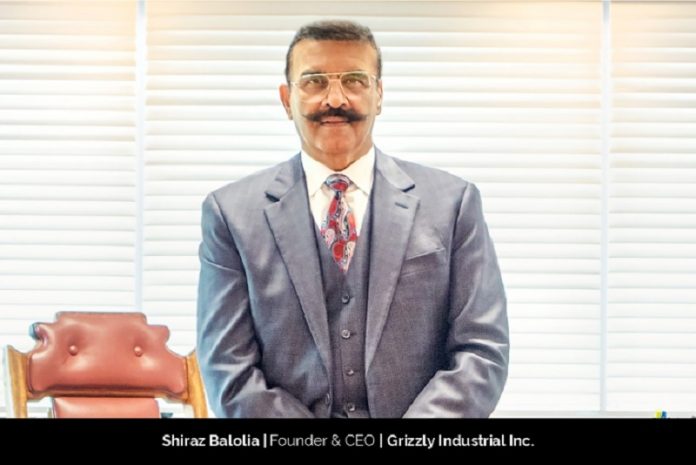Shiraz Balolia is an unassuming man. He does not like to make bombastic claims or boasts about his achievements, even though he is the founder and CEO of Grizzly Industrial. It is one of the first U.S. companies to tap into the direct-to-end-user model to sell its products – much before Amazon made it the norm.
Grizzly Industrial, established in 1983, is a retail, mail order, and internet company selling high-quality woodworking and metalworking machinery and accessories. Shiraz has built this successful company from scratch. And the idea to start Grizzly Industrial, originally called Grizzly Imports, took roots when a young hobbyist, Shiraz, realized that money could be made buying and selling machinery. In the early 1980s, there was no woodworking and metal machinery business that was selling directly to the end-users; thus, the direct-to-end-user model of Grizzly immediately attracted the attention of potential customers due to the lower pricing. And, soon, its sales took off faster than he expected.
Today, Grizzly is a modern-day machinery powerhouse. It has two large distribution centers with almost a million square feet of space, offices in Taiwan and China, and multiple showrooms on the West Coast and the mid-South. Grizzly has never built a dealership network or assigned a role to middlemen. It continues to sell its top-quality, award-winning products directly to end-users.
A Hobbyist Gets an Idea to Start Business
A young Shiraz wanted to own a new lathe as a hobby, but he did not have the money to buy it. So, he began to buy used metal lathes, fix them and then sell them for a slim profit. His aim was to make enough money so that he could buy the latest lathe for himself. And, while selling the used lathes, he realized that money could be made from buying and selling machinery. “I quickly abandoned my quest for a hobby machine for myself and considered making this an opportunity to make money,” Shiraz says.
At the time, in the pre-internet era, companies were not directly selling machines to their customers. They used the indirect distribution channel, which involved multiple intermediaries, to reach end-users. Shiraz points out that manufacturers or importers would first sell their products to distributors, who would sell them to dealers. And dealers would ultimately sell them to end-users.
Shiraz felt that middlemen were not at all required. Their involvement did not enhance the value of a product; instead, they caused its price to increase. “My goal was to cut all these fat cats in the middle and sell directly to customers at a really low price,” Shiraz says. He had a clear business idea and was very sure about the type of company he wanted to establish.
In 1983, Shiraz set up a mail-order business, called Grizzly Imports, in Bellingham, Washington, to sell woodworking and metalworking machinery and accessories. And, instead of roping in distributors and dealers to help sell his machines, Shiraz decided to sell them using magazine ads and catalog marketing. Target customers would call Grizzly after seeing the ad. They would place an order or ask for a catalog, which the company would mail them. Also, if they liked a product, they would fill an order form — which would be inside the catalog — or call the company to order it. “Remember, there was no internet back then,” Shiraz says. “The ratio of orders received by mail versus people calling in was roughly 80 percent mail-order and 20 percent phone call.”
“Our business model from the very beginning was to buy directly from the factory and sell directly to end-users, cutting out all middlemen,” Shiraz says. “This is a model that has now been embraced by many businesses, including large companies such as Amazon.”
In the beginning, Grizzly focused primarily on machinery, and then it began to gradually add more accessories. From a humble beginning with a handful of products, the company now has the largest selection of machinery under one brand in the U.S, and perhaps in the world as well, Shiraz says.
Shiraz could build a thriving company not only because he had a great idea, but also because he was focused and diligent. And, in order to create a solid foundation for Grizzly, he followed the principles of good organization, embraced good accounting practices, always paid vendors and employees on time, and never procrastinated.
Learning from Mistakes and Failures
For a business, the road to success is littered with challenges and obstacles. They are a “natural part” of a business, Shiraz says, adding that there will always be problems when one is running a company. From time to time, he has to deal with employee issues, defective products, supply-chain or delivery problems, delays in manufacturing, lawsuits, security, and other unexpected issues such as the pandemic. But, he does not let challenges ruffle him, as he believes that there is no business without problems. And he also understands the value of mistakes and failures and highlights that one can learn from them. Along with challenges, failures also make a person strong, Shiraz says, adding, “You learn to deal with the problems and learn from mistakes – the reasons for your failures – you made.”
Never Get Caught Up in Trappings of ‘Success’
What is success for Shiraz? He has his own definition for it, and he has avoided getting caught up in the trappings of the word “success.” “I have never thought about success as people generally define it,” Shiraz says. “Success comes naturally when one achieves the original goal one sets out for.” And he has achieved his original goal of establishing a profitable business that would sell goods at a fair price to customers.
Advanced User of Company’s Products
Shiraz is an advanced user of Grizzly’s products. And he never forgets that it is his hobby of machines that led to the creation of Grizzly. In his younger days, as a hobbyist who had not enough money, he would search for popular products and price them after looking through the lens of a customer. Shiraz believes that this approach has been the key to Grizzly’s growth and success.
He reveals that he is familiar with, or has often used, every product that his company sells. “I have two very large shops. One at home and one here at work,” Shiraz says. “You could say that I am an advanced user of the products we sell.” As he is a user first and a seller after that, his company has been developing new items and modifying existing items as per customer requests and logical user requirements.
A Workaholic Who Does Not Crave Recognition
A self-confessed workaholic and an intense man, Shiraz does not like being in the limelight and has never sought any kind of recognition. “In fact, for the first 15 years after starting the company, I refused to give interviews to any magazine or newspaper for any type of a business article,” Shiraz says.
In the initial years, he kept a low profile and worked hard to increase his company’s market share without making PR or marketing noise about it. He never boasted about his achievements or tried to shine a light on himself. “Competitors watch your every move, so why boast about your successes,” he says. “Let them think you are struggling. It worked really well for my business.”
Shiraz values his employees. He treats them with respect and integrity, the way he would like others to treat him. And he has also always paid them fairly. Shiraz believes that a company can demand that employees work hard, but first, it needs to equip them with the tools to produce quality work.
A majority of Grizzly’s employees are loyal to the company because they are treated well and promoted at work. “We promote from within,” Shiraz says. “This instills confidence in the hard-working employees, especially those who believe that their long-term career goals align with the company’s.” Because of this promotion policy, the company has a low attrition rate. It has a large number of long-term employees. Some of them have worked with the company for over 30 years. “We have over 20 managers who have an average tenure of more than 19 years with the company,” Shiraz says. “Almost every manager was promoted from within. And some of the managers’ kids work for us now.”
Vision for Grizzly Industrial
In the last few years, the company has expanded its computer numerical control (CNC)-line of machines, fulfilling the demands of businesses that require it. And automated manufacturing can utilize these machines as well. Shiraz says that the company intends to expand this line further, but it will continue to sell manual machines as there still is a great demand for them.
Grizzly, according to Shiraz, is on fast growth pace. “With the management team as well as sophisticated processes we have in place, we see no end in sight for the company’s growth opportunities,” he says.
Enjoying Semi-Retired Life
Shiraz worked for very long hours ever since he founded the company. Now, he is no longer actively involved in the running of Grizzly. Now, his son, COO Shabir, who has been with the company for over 20 years, handles the day-to-day responsibilities. And President Robert McCoy is in charge of the day-to-day management. “I hired Robert as warehouseman, more than 30 years ago, and he has risen through the ranks to become the company’s president,” Shiraz says.
For a few hours, Shiraz still comes to work every day. But, he is now mostly working on a variety of issues related to some of the other companies he owns. He is also making project videos for Grizzly. “I enjoy making them, as my hobby is to create things using latest equipment,” Shiraz says. “It is a good way to semi-retire and pull back without turning the switch off entirely.”
Shiraz has many hobbies, including shooting. “I am a long-range shooter and have been on the US national team for about 15 years,” he says. “And I am also the former captain of the US team.” He also owns a boat, and occasionally, he goes fishing for salmon as well as goes crabbing.
“My personal goals,” Shiraz says is to remain in semi-retirement and continue to pull back more as time goes by. “I think I have put in several lifetimes of work in my various businesses and it is time to enjoy more of my hobbies and life in general,” he adds.
Put in the Hard Work and Success Will Follow
The flower of success cannot bloom without efforts. Shiraz says that many businesses fail or are entangled in a web of issues because their owners lack oversight and rarely show up. If aspiring leaders want to establish a business of their own, they must put in the hard work to be successful, Shiraz says. “Success comes from really hard work.” Also, they should be actively involved and oversee the operation of the business, especially when it is in the growth phase.
“A Bad Case of Capitalism,” Shiraz’s autobiography, is a must read for those who are unable to move forward because of self-doubts, lack of determination, and their wavering confidence in themselves. “The autobiography is meant to energize young and older minds alike, and dispel thoughts that you cannot be successful without outside help,” Shiraz says. “Everyone has inner strength and determination that can be brought out. I wrote my story to help you discover your own.”
Read Full Magazine Here
********************





